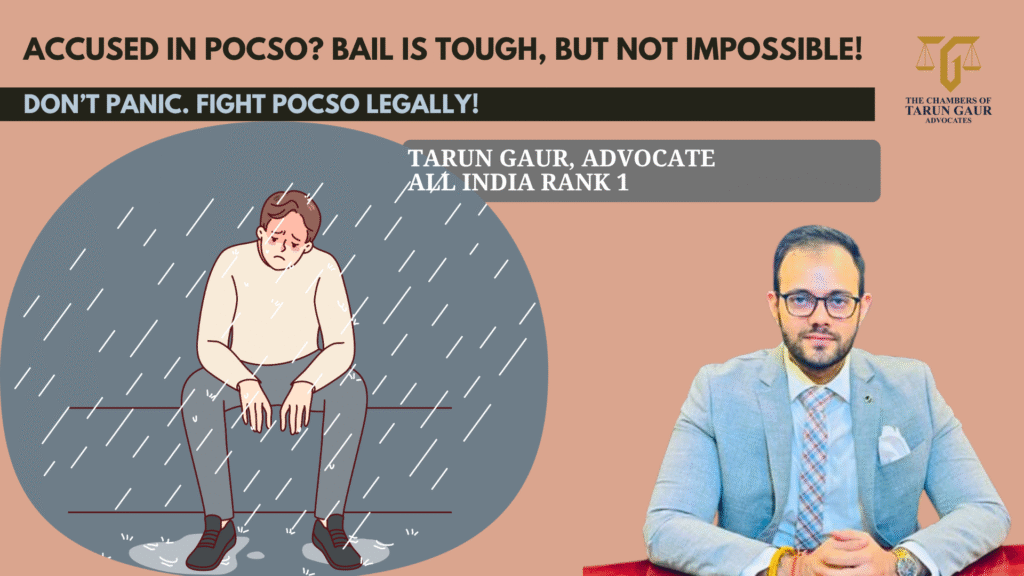Getting caught up in a POCSO case (Protection of Children from Sexual Offences Act, 2012) can be one of the most traumatic legal experiences — not only for the accused but also for their family. The law is strict, the procedures are sensitive, and the stigma attached to such cases can ruin reputations even before a trial begins.
This blog aims to guide individuals and families through the bail process under POCSO, the steps to be taken after an FIR, and legal strategies to protect one’s rights.
⚖️ What is the POCSO Act?
The POCSO Act, 2012 was enacted to safeguard children (under 18 years) from sexual offences, including assault, harassment, and child pornography. It is gender-neutral, mandates child-friendly procedures, and prescribes harsh punishments — including life imprisonment in some cases.
Most offences under POCSO are:
-
Cognizable (police can arrest without a warrant)
-
Non-bailable (bail is not automatic)
This makes legal representation essential right from the start.
🚨 What Happens When You’re Named in a POCSO Case?
-
FIR is Registered Immediately
The police must register an FIR without delay once they receive information about a cognizable offence. -
Arrest Without Warrant
The accused can be arrested straight away — without prior notice. -
Medical Examination
If required, the child is taken for a medical exam in a child-friendly environment. -
Investigation and Chargesheet
Police must file the chargesheet within 90 days of FIR registration. -
Trial in Special Court
POCSO cases are tried in Special Courts and must be concluded within one year from the date of commencement.
💥 Even before trial begins, the accused may suffer:
-
Suspension from work
-
Public humiliation and social isolation
-
Mental health trauma
-
Restrictions on travel and family life
🛑 POCSO Bail: Can You Get It?
Bail is not a right under POCSO, but courts may grant bail based on several mitigating factors:
✅ When Bail May Be Granted:
-
Prima facie innocence: FIR appears fabricated, vague, or lacks clarity
-
Juvenile or Young Accused: Courts often take a sympathetic view
-
Delays or Contradictions: Delay in lodging FIR, or contradictions in witness statements
-
Weak Evidence: No forensic or medical evidence to support the allegations
-
False Implication: Often seen in family property disputes, enmity, or revenge scenarios
Courts will still consider:
-
The gravity of the offence
-
The possibility of tampering with evidence or influencing the child
-
Whether the accused is likely to flee
🛡️ Anticipatory Bail in POCSO Cases
Anticipatory bail is not barred under POCSO — except where the offence is punishable with life imprisonment or death, like aggravated penetrative sexual assault.
High Courts and Sessions Courts have discretion to grant anticipatory bail depending on:
-
The nature of allegations
-
Supporting documents of innocence
-
Lack of direct involvement
-
Medical/forensic findings
🔍 What to Do If You Are Falsely Accused Under POCSO
-
Stay Calm — Don’t Panic
Emotional reactions may worsen the situation. Avoid contacting the complainant or discussing the case publicly. -
Engage an Experienced Criminal Lawyer Immediately
Choose a lawyer with real experience in POCSO matters. A smart bail application can save you from unnecessary jail time. -
Preserve All Relevant Evidence
Retain WhatsApp messages, emails, CCTV footage, or anything that could prove your innocence. -
Consider Quashing the FIR
If the case appears false, a petition under Section 482 CrPC can be filed in the High Court to quash the FIR. -
Avoid Media & Social Media Discussions
Anything posted online can and will be used against you in court.
📄 Legal Strategy for POCSO Defence
-
Be present during medical exams and child’s statement (through legal rep)
-
Apply for bail at the earliest (anticipatory or regular)
-
Use documentation and contradictions to challenge charges
-
Involve a counselor or mental health expert, if required
-
Explore witness protection in cases involving threats or social danger
✅ Conclusion: Accusation ≠ Guilt
Being named in a POCSO case does not automatically mean guilt. The legal system provides opportunities to defend yourself, challenge false accusations, and secure bail under appropriate grounds. The key is to act fast, stay legally advised, and avoid mistakes that can backfire.
👨⚖️ Need Legal Help in a POCSO Case?
If you or someone you know is facing a POCSO case in Delhi, especially in Dwarka Court, do not take chances. The process is strict — and experience matters.
Contact Advocate Tarun Gaur — an experienced criminal lawyer in Delhi, ranked All India Rank 1 in Law, known for his strategic approach in POCSO bail applications, quashing petitions, and courtroom defence.
📞 Your rights deserve expert protection. Reach out today.

